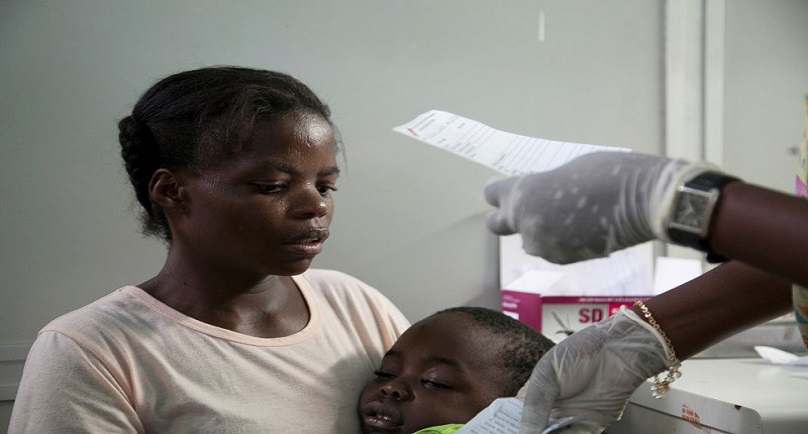Image: A mother holds her son suffering from yellow fever as she waits for a prescription at a hospital in Luanda?, Angola, March 15, 2016. REUTERS/Herculano Coroado
By Sebastien Malo
NEW YORK (Thomson Reuters Foundation) – Angola is suffering its worst outbreak of yellow fever in 30 years with 350 deaths since last December, the International Federation of Red Cross and Red Crescent Societies (IFRC) said on Wednesday as it launched an emergency appeal for funds.
With a yellow fever epidemic underway in neighboring Democratic Republic of Congo, public health authorities have been scrambling to keep the disease from gaining a foothold in Angola.
Yellow fever, a mosquito-borne haemorrhagic virus, results in death rates as high as 75 percent in serious cases but its transmission can be prevented with a vaccine.
Yellow fever has killed 356 people in Angola and infected more than 3,400 infected since late last year, according to World Health Organization (WHO) and Angolan government figures that IFRC cited.
In the Democratic Republic of Congo (DRC), which shares a frontier to the northeast of Angola, suspected cases numbered about 1,307 and deaths 75 as of late June, according to the WHO. Congolese authorities declared a yellow fever epidemic in the capital and two provinces last month.
The WHO said in late June it was scaling up its efforts to combat the outbreak with the launch of an emergency vaccination campaign in July along the border between Angola and DRC, as well as in the Congolese capital Kinshasa.[nL8N19F1J5]
But efforts to vaccinate the two countries’ populations have been hampered by logistical challenges, including a shortage of yellow fever vaccines.
In Angola, suspicion about the effectiveness of vaccines over traditional medicines was another hurdle, IFRC spokeswoman Camelia Marinescu told the Thomson Reuters Foundation by phone from the country’s capital city Luanda.
“People take traditional plant-based medication which, when it comes to yellow fever, do more harm than good,” Marinescu said. “Consequences … can be lethal.”
In an effort to dispel myths, IFRC staff and volunteers have been helping the Angola Red Cross with door-to-door visits and targeting the southern African country’s media to raise awareness about the disease, the IFRC said.
“The message of our community mobilizers (is to) quickly go to the closest health center or hospital,” Marinescu said.
More than 11 million yellow fever vaccines have been administered in Angola between Dec. 5, 2015 and July 5, 2016, she said.
Even so, suspected cases of yellow fever have been reported in Angola’s 18 provinces, the IFRC said as it launched an appeal for 1.4 million Swiss franc ($1.4 million) appeal to fund its work to help stem the outbreak in the country.
($1 = 0.9755 Swiss francs)
(Reporting by Sebastien Malo, Editing by Katie Nguyen.; Please credit the Thomson Reuters Foundation, the charitable arm of Thomson Reuters, that covers humanitarian news, women’s rights, trafficking, property rights and climate change. Visit http://news.trust.org)
Copyright 2015 Thomson Reuters. Click for Restrictions.


